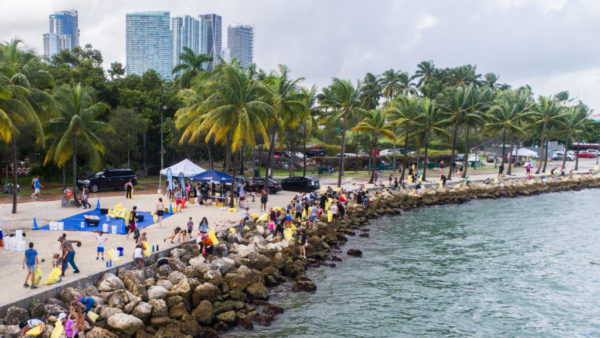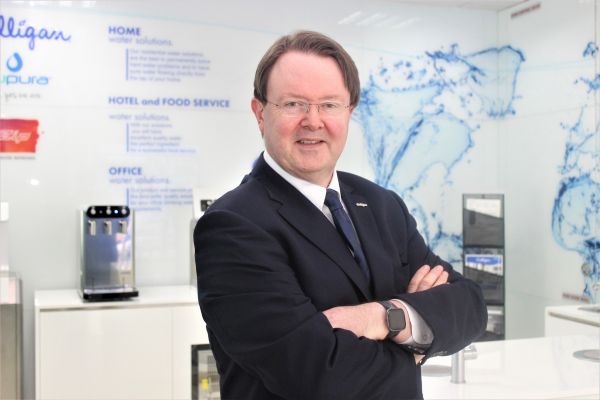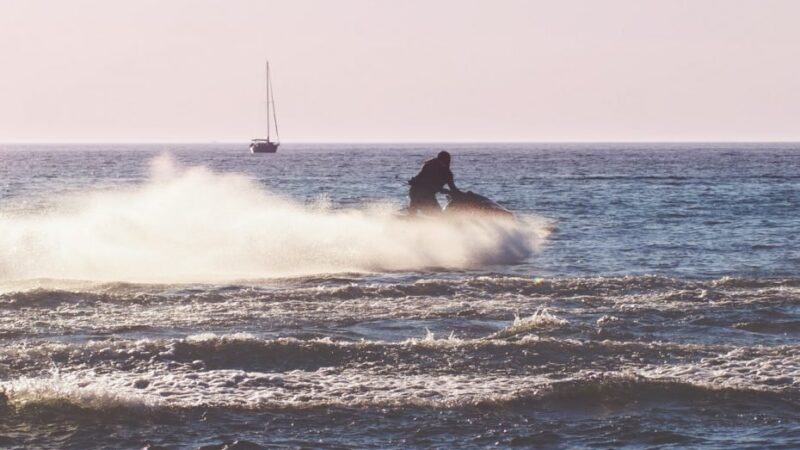
Local non-profit Sendit4thesea has cleaned over 11,000 pounds of trash from Miami parks and beaches, including Bayfront Park (Theo Quenee via Key News)
A new student-led nonprofit is tackling the plastic pollution problem in Miami-Dade County one beach cleanup at a time.
Theo Quenee and Coby Barreras – both 2017 graduates from MAST Academy on Virginia Key – launched Sendit4thesea in July 2019 and have already collected over 11,000 pounds of trash from local parks and beaches.
On Thursday night, the young entrepreneurs presented “The Story of Plastic” at the Key Biscayne Community Center to educate the community about plastic pollution as part of the Citizen Science Project’s Lecture Series.
Growing up active in water sports — surfing, kiteboarding, wakeboarding, freediving, paddle boarding and sailing — made them keenly aware of the plastic problem in the ocean and helped to foment their dedication to cleaning up the environment. In fact, the “Sendit” name comes from the expression used by extreme land and water sports athletes and means “go for it.” There is the added hope that the reference will encourage athletes to get involved and educated.
Barreras has gone on to major in sustainability at Florida International University, and Quenee made headlines in 2017 after Hurricane Irma when he rescued hundreds of uprooted mangrove seedlings in a makeshift greenhouse on his roof and replanted them in a local mud flat.
“In the future I also want to change the way we consume single-use plastics and teach younger generations and communities how to properly conserve our environments,” he said at the time.
The impulse to incorporate as nonprofit, however, didn’t come until a trip to Nicaragua early last year, where the pair was struck by the polluted waters and trash being burned on the beach.
“We took a trip to Nicaragua and we saw just how bad the plastic was there. When you go to a place and they don’t have the infrastructure to deal with plastic, it just hits so much harder,” Quenee says.
Inspired to make a change at home, Sendit4thesea was born and has already organized regular park, beach and kayak cleanups from Matheson Hammock, Miami Beach and Bay Front Park to Rickenbacker Island, Crandon Marina and Hobie Beach. Up to 200 volunteers turn out for the events, and the organization is now looking to add SCUBA diving cleanups near the shore where there is significant boat activity.
“Wherever the boats are, there will also be trash,” Barreras notes.
Trash collected includes single-use plastics — water bottles, straws, food packaging — Styrofoam, backpacks, fishing line and nets, suitcases, rope, syringes, hair brushes and cigarette butts.
Another important part of the Sendit4thesea mission is a School Talks program to teach young people about the present and future problems of plastic pollution. Quenee, a videographer and photographer, creates the presentations, while Barreras covers the science and information on plastic alternatives.
When asked what people can do to limit their plastic consumption, Quenee and Barreras have a slew of recommendations from avoiding single-use plastics to reading up on the issue.
“Becoming informed about plastics is extremely important, and there is a lot of information available on plastics on the Internet,” Quenee says.
They also recommend passing that information forward to raise awareness and reduce contamination. Their own social media accounts are full of jarring facts about the effect of plastics on humans, animals and the planet:
— Chemicals released when burning plastic can disrupt hormones and cause cancer.
— By 2050, 99 percent of seabirds will have injested plastic.
— Up to 1,900 plastic fibers can be released when washing a synthetic garment.
— The Centers for Disease Control has found BPA in the urine of 93 percent of surveyed Americans over age 6.
— The average American throws away 4.4 pounds of trash a day.
Concerned citizens can also participate in one of the Sendit4thesea beach and park cleanups, including one on Rickenbacker Island from 9 a.m.-noon Feb. 1 and a kayak cleanup off Shake-A-Leg Island in Coconut Grove from 2-6 p.m. Feb. 5.





Recent Comments